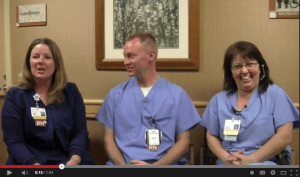 Today, I'm traveling to Tokyo, but I'm still thinking of the amazing nurses and leaders at Franciscan St. Francis Health in Indiana. Through my co-author Joe Swartz, the director of business transformation, their work is featured heavily in our book Healthcare Kaizen. I hope to share their examples and inspiration next week with our hosts and my fellow tour attendees from around the world.
Today, I'm traveling to Tokyo, but I'm still thinking of the amazing nurses and leaders at Franciscan St. Francis Health in Indiana. Through my co-author Joe Swartz, the director of business transformation, their work is featured heavily in our book Healthcare Kaizen. I hope to share their examples and inspiration next week with our hosts and my fellow tour attendees from around the world.
In early October, I had a chance to spend a day again at Franciscan, visiting some departments and talking with staff and leaders. Joe and I shot many video interviews and I'll be sharing pieces of them here on the blog and my YouTube channel.
In this first brief video, three nurses from the Endoscopy talk about their culture of continuous improvement. Andee, pictured at left, is a nurse who has implemented more than 200 Kaizens (as I mentioned Monday). In the department, when they see a problem or when they realize they've improved something, they say “That's a Kaizen!” to each other.
Andee, at the start of the video, talks about blurting out that phrase in front of her mother, who didn't know what Kaizen is :-)
I think it's really powerful to see and hear how they talk about improvement. It does bring joy and happiness.
Once you get the ball rolling with Kaizen (usually starting with really small “baby steps” improvements), it really does become a way of thinking. You start finding improvement opportunities as you go through your daily work (instead of Kaizen being a separate activity that you have to carve out time for).
Another thing that stands out to me is Andee describing how nobody is trying to reduce cost or increase throughput as a primary goal. She realizes they ARE doing that, but cost and throughput come as an end result of focusing on:
- How are we helping a patient be more satisfied?
- How are we making our department happier?
- How are we doing a better job?
- How are we making this a safer place for everyone?
Those are things that staff get excited about, tapping into their intrinsic motivation to make things better and provide the best care.
Andee says things would be different if management told them they had to reduce costs. As I shared before (“Throat Scopes & Applesauce“), many Kaizens make things better for patients and staff, while maintaining quality (if not improving it), AND reducing costs.
Andee says:
“This is your freedom. This is your empowerment. Run with it!”
As you'll see in other videos, managers are still involved in the Kaizen process. But they're not controlling every detail. “Try something and see if it works!” is the common mantra there (and, yes, they talk about things first rather than just wildly experimenting).
My advice, if you're trying to start with Kaizen is to NOT talk about cost savings. Your staff have heard that before. Instead, ask them to fix things that matter to them. Make things very broad and open ended. Small improvements are great. Don't require cost savings or ROI for each Kaizen.
Over time, people will start to work on bigger things and you can better align improvement to department and hospital-wide goals and measures (while still asking people to fix “what bugs them”).
Andee says they're “Kaizen crazy” but perhaps other organizations are crazy for not engaging their employees this way.
Video Transcript:
Andee: My family even teases me about it. I was at home one day and we were talking about something like, “Oh my gosh, mom, that's a Kaizen,” and she's like…
[laughter]
Andee: But you know what, I mean it is. It's the way you think. You're constantly, how are you improving a process? How are you becoming more effective, more efficient? That is the goal and instead of looking at it, I think another part of it is none of us look at it as, “OK, how are we trying to save money or increase throughput?”
That is what we're doing, but that's not how we think of it.
Tonda: That's not it.
Andee: We think of it, how are we helping a patient be more satisfied? How are we doing…
[crosstalk]
Tonda: …happier?
Andee: …and better job at our jobs? How are we making this a safer place for everyone? That's where we think about. I think if we have that focus from our management team that said, “You know, you have to save money,” I think it would be different. It would have a different feel to it. It would feel more like, “OK, you're in trouble. This is a discipline.”
It's more of, “This is your freedom. This is your empowerment. Run with it.”
So, we're Kaizen crazy.
[laughter]
Please scroll down (or click) to post a comment. Connect with me on LinkedIn.
Let’s build a culture of continuous improvement and psychological safety—together. If you're a leader aiming for lasting change (not just more projects), I help organizations:
- Engage people at all levels in sustainable improvement
- Shift from fear of mistakes to learning from them
- Apply Lean thinking in practical, people-centered ways
Interested in coaching or a keynote talk? Let’s talk.
Join me for a Lean Healthcare Accelerator Trip to Japan! Learn More









